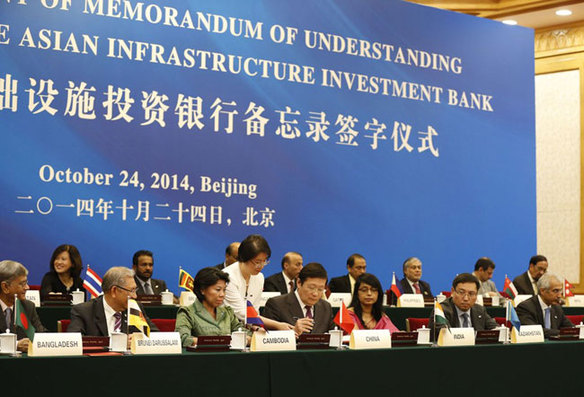 |
|
Chinese Finance Minister Lou Jiwei (C) signs with guests at the signing ceremony of the Asian Infrastructure Investment Bank at the Great Hall of the People in Beijing on Oct 24, 2014. [Photo/CFP] |
On Thursday, the minister of finance announced that it received confirmation from the United Kingdom that it was applying to join the Asian Infrastructure Investment Bank as a founding member. If admitted, UK would be the first member of the G7 to join the AIIB. Comments:
The United States has its own design for the world's financial order: it dominates the World Bank while Japan leads the Asia Development Bank; that's why it considers AIIB a China version of neo-Monroeism and is opposed to the UK joining it. This is wrong because the AIIB's shareholdings are distributed according to members' GDP, and China has shown its open attitude in building the AIIB by welcoming UK's participation, which will diminish its equity in it.
Beijing News, March 14
Accepting the UK as a founding member will help the AIIB improve its governance structure and international image. Currently most of its founding members, except China, India and Singapore, are emerging economies and all they have is a huge demand for funds instead of supply. The UK can set a good example for other developed economies to follow, which will benefit the AIIB and make it more effective.
Li Wei, a researcher at the National Academy of Development and Strategy, Renmin University of China, March 13
The UK's move should be analyzed not only as an economic move, but also a political one. As a major power with faded glory, the UK is actually in an embarrassing position in the European Union, while the US has shown some hint of balancing this traditional ally with others. By co-building the AIIB, the UK can improve its relations with Asian economies, get abundant funds when needed, and boost its domestic development.
Xu Yili, economist, via ifeng blog, March 15
Looking forward, the US needs to move beyond obstructionism and figure out a better strategy for dealing with China's competitive economic diplomacy. This includes working constructively to help shape institutions of Chinese origin and figuring out which institutions really endanger a stable regional order in East Asia. It should also be a wake-up call for Congress to support the Trans-Pacific Partnership and a pro-active economic strategy in the Pacific.
Thomas Wright, fellow on Foreign Policy at Brookings Institution, March 13